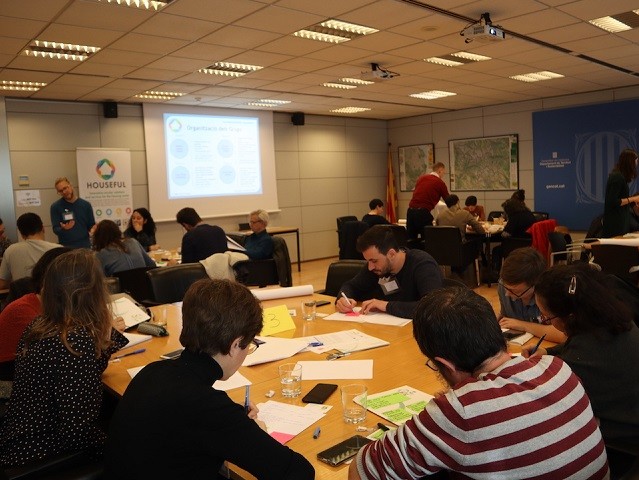Co-creating in Austria and Catalonia
What does it take to co-create functional and sustainable buildings? This is the question answered by WE&B, which organised together with alchemia-nova, Neues Leben and the Housing Agency of Catalonia (AHC) ten workshops earlier this year as part of the EU initiative HOUSEFUL. The goal of the workshops was to assess co-creation ideas for circular buildings together with stakeholders in the housing sector. The ideas had been collected via a number of social analyses conducted by WE&B between March 2019 and February 2020 and based on interviews and questionnaires. The ideas will be integrated with the HOUSEFUL services and solutions being developed in the four project demo buildings in Austria and the Barcelona area. See the HOUSEFUL call-to-action video(opens in new window) (also available in Spanish, Catalan and German) for more information on the objectives of the workshops. Circular buildings are rapidly becoming a fundamental component of modern and future towns and cities. Their importance is justified by the high resource consumption and environmental impact experienced in the housing sector. Due to its current linear approach, this sector is responsible in the EU for 9% of the GDP. It uses 50% of extracted materials, consuming 40% and 30% of final energy and water respectively, and producing one third of total EU waste. The co-creation ideas considered in the workshops address the desired circularity outcomes in the housing sectors of the demo-building regions. For example, one such idea focuses on the importance of community cohesion for the long-term uptake of circular solutions. With a view to create socially resilient solutions, the wide-ranging ideas also covered: cost reduction, promotion of HOUSEFUL benefits, a user-centric training programme for managing the services, and the need for a social facilitator for the long-term management of circular solutions in buildings. The first HOUSEFUL co-creation workshop was hosted by the Catalonian Department for Territory and Sustainability in early March this year. It focused on the project's services and solutions in Bloc dels Mestres, Sabadell near Barcelona, one of four HOUSEFUL demo buildings. Due to the outbreak of the Covid-19 pandemic, the workshops in the other demo buildings were held online in June and July. They consisted of nine 1.5 hour online sessions divided into small working groups. Four of these focused on Bloc dels Mestres (following on from the first workshop), two on the demo building in Sant Quirze del Vallès, one on the Cambium Community Center in Fehring (Austria) and two on the demo building in Vienna. The workshops led to four action plans describing the development of the co-creation ideas in Bloc dels Mestres. As for the other demo buildings, a new batch of workshops will be launched in autumn 2020 to prepare plans for applying ideas deemed suitable in those buildings. Overall, some 34 stakeholders participated in the workshops, including local councils, housing cooperatives, public energy agencies, specialist firms and the inhabitants of the demo buildings. FURTHER INFORMATION HOUSEFUL is a project funded by the Horizon 2020 programme of the European Union. Its main goal is to boost circularity in the housing sector. This will be achieved by implementing 11 innovative solutions as services, aimed at the efficient management of materials, waste, water and energy along the entire housing value chain. These services will be demonstrated in four demo sites in Spain and Austria.



